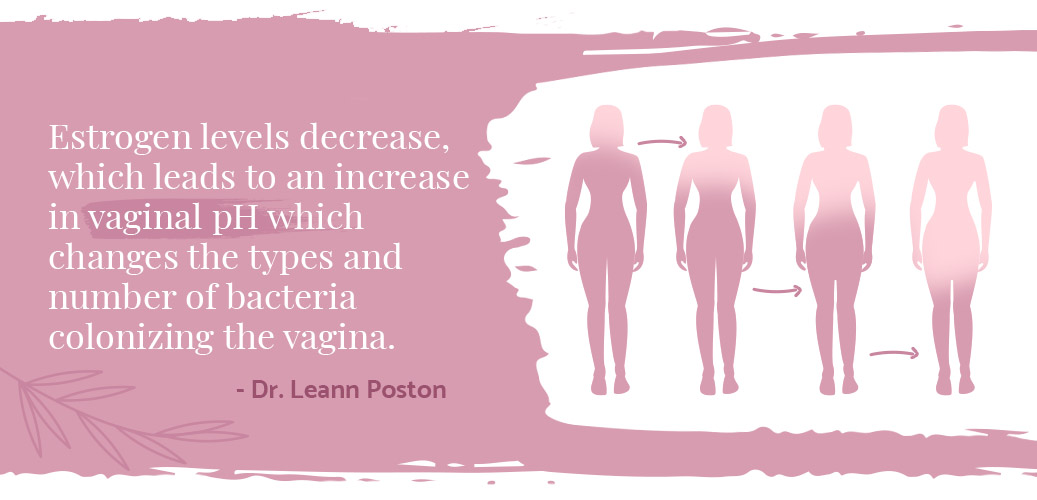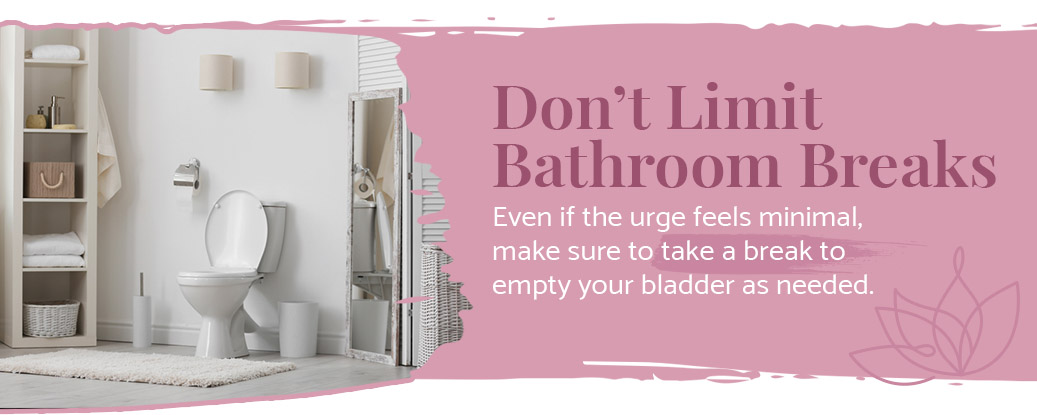
Menopause and UTIs: Understanding the Connection

Menopause symptoms like vaginal dryness and hot flashes are par for the menopausal course, but there’s one oft-overlooked symptom that many women don’t see coming — urinary tract infections (UTIs). Due to the same physiological changes that cause the more well-known symptoms, studies show that UTI risk increases with age. In fact, nearly 20 percent of women over 65 experience UTI, compared to just 11 percent of the general population.
Understanding why this happens and what you can do about it is important to helping you develop a treatment and care plan for lasting menopause relief so you live your best life well into your postmenopausal years.
Shop All Menopause Relief Products
Why Menopause Causes UTIs
Why, exactly, do women tend to experience an uptick in this unpleasant symptom? Unsurprisingly, it all has to do with the same changes — namely, the dip in the hormone estrogen and how it affects the body — that cause symptoms like hot flashes and dryness. According to Dr. Leann Poston, M.D. and medical advisor for Impakt Fitness, the reason why menopause causes an uptick in urinary tract infections is twofold.

“Estrogen levels decrease, which leads to an increase in vaginal pH which changes the types and number of bacteria colonizing the vagina.” - Dr. Leann Poston
Let’s start with the dip in estrogen, which is to blame for so many of the most common vulvar changes in menopause, including UTI. “Menopause causes several changes that increase the risk of urinary tract infections,” says Dr. Poston. “Estrogen levels decrease, which leads to an increase in vaginal pH which changes the typReflex Ies and number of bacteria colonizing the vagina,” she says.
Additionally, physiological changes in the pelvic muscles and tissues can contribute to the problem. “Weakness and sagging of the pelvic floor muscles decrease the distance between the vagina and the urethra and increase the risk of urinary retention,” says Dr. Poston. What’s more, vaginal tissue tends to get thinner with age, which increases a woman’s risk of developing all kinds of infections.
What You Can Do About It
No matter if you’ve experienced a UTI before or not, practicing prevention and understanding treatment options is critical to your intimate care routine during menopause. Here are some great ways to deal with UTIs during menopause and beyond.

- Don’t Limit Bathroom Breaks — One of the simplest ways to handle a lingering UTI is to make sure you’re always taking routine bathroom breaks. Even if the urge feels minimal, make sure to take a break to empty the bladder as needed.
- Practice Pelvic Floor Exercises — As previously mentioned, pelvic floor weakness can cause a heightened risk for UTIs. Regularly practicing pelvic floor exercises such as Kegels can help you strengthen the muscles to prevent weakness and sagging, which can contribute to UTI. You can easily practice pelvic floor exercises at home, or your doctor may recommend pelvic floor physical therapy with the help of a professional.
Check Out Our Helpful Guide on Pelvic Floor Exercises
- Drink Plenty of Fluids — Although it may seem counterintuitive, you don’t want to limit the consumption of liquids when experiencing UTI symptoms. Dehydration can actually increase your risk of UTI, so staying hydrated is important before, during and after the onset of symptoms. You’ve probably heard that drinking cranberry juice can help treat UTIs, but the research on its efficacy is mixed. Cranberries do contain bacteria-fighting components, but it’s not clear whether there are enough of them to help. With that said, cranberry juice contains vitamins and can help you stay hydrated, so drinking it throughout the day is not likely to cause any adverse reactions.
- Consume Probiotics — Adjusting what you do and don’t eat can help you get the growth of bacteria under control to help treat UTI. Getting probiotics — or “good” bacteria — through your diet by eating foods like plain Greek yogurt and fermented foods can help keep the bad bacteria at bay.

- Watch Your Diet — While some foods can help you manage UTI, some tend to worsen it. But avoiding certain trigger foods can help. Many people find that more acidic foods can worsen UTI symptoms, whereas certain types of berries can lessen them.
- Take Antibiotics — If you find that the above tips don’t help curb UTI recurrence, you may want to speak to your doctor about medication. Antibiotics can help kill the bad bacteria that take over because of lower estrogen levels. However, due to the threat of antibiotic resistance, they should be prescribed sparingly.
Unfortunately, due to the natural changes that happen within our bodies at this stage of life, there’s a good chance many of us will experience UTI as we age. Thankfully, there are many great ways to reduce symptoms and help prevent recurrence. Arming yourself with the appropriate knowledge and having a treatment plan is a great way to keep yourself happy and healthy as you age.
Discover More Helpful Posts on Our Blog
Image Credits:
YAKOBCHUK VIACHESLAV/Shutterstock.com
New Africa/Shutterstock.com
Ekaterina Pokrovsky/Shutterstock.com
Akarat Phasura/Shutterstock.com